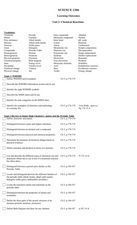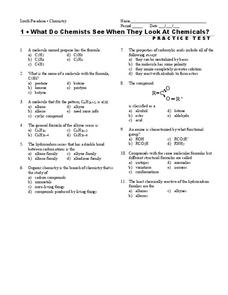Curated OER
Learning Outcomes
In this science worksheet, learners explore the learning outcomes for a unit on chemical reactions. Students define 60 vocabulary words and answer a list of questions for each topic.
Curated OER
More Thermochemistry Problems
This two-page assignment covers basic thermochemistry concepts. Chemistry learners identify exothermic and endothermic processes, explain a phase change graph, and draw an energy level diagram. There are no problems to solve, just...
Curated OER
Matter and Chemical Bonding
For this chemical bonding worksheet, students read about the invisible killer, dihydrogen monoxide. Students read about the products it is used in and the problems it causes to the environment. Then students complete 19 short answer...
It's About Time
Organic Substances
Host an exciting lab in which learners burn fruit rinds to better understand hydrocarbons. A reading passage and analysis questions wrap up the lesson.
Curated OER
Candy Reaction
In this triboluminescence worksheet, young scholars use wint-o-green Lifesavers to observe a chemical reaction that gives off light. They break a lifesaver up with a hammer and make observations and they chew a lifesaver and make...
Curated OER
A Little Chemistry
The molecular properties of water are the focus of this chemistry-based assignment. Multiple-choice, true-or-false, matching, and fill-in-the-chart style questions query assignees about the forces that hold the water molecule together,...
Curated OER
Chemical Reactions
In this reactions worksheet, students state the differences between a coefficient and subscript and an exothermic and endothermic reaction. Students review the different types of reactions. This worksheet has 13 short answer questions.
Curated OER
Naming II-More Practice
In this naming chemical compounds worksheet, students are given 10 pairs of elements that bond and students write the formulas and the names of each compound. Students practice writing the formulas for compounds given the names and they...
Curated OER
Unit 4 - Periodic Table
There are 17 multiple choice questions on this periodic table test. The focus is on properties of the elements by group and period. The exam is not formatted well, making it a little difficult to read. There is also a typographical...
Curated OER
The Ties that Bind
In this bonding worksheet, students read about the types of bonds that hold compounds together. They are given fifteen common materials and they identify the types of bonds that hold each together.
Pingry School
Comparing Activities of Selected Metals
Don't overreact! A simple experiment demonstrates chemical reactions as scholars mix chemical solutions and metals in a large well plate. They note all changes to the metals, solutions, precipitate, colors, and more. A full data table...
Curated OER
Hydrocarbons
In this chemistry worksheet, students use the clues given at the bottom of the sheet to complete the crossword puzzle on hydrocarbons. There are 17 statements to solve and fill in on the puzzle.
Curated OER
Bonding Basics - Covalent Bonds
In this chemistry worksheet, students complete the chart for each of the given elements by naming the number of protons, electrons, Valence electrons, and the electrons used to fill the outer shell. Then they complete each covalent bond...
Curated OER
What Information is on the Periodic Table?
In this elements worksheet, students review the information that is found on a periodic table including atomic mass, chemical symbol, atomic, number, and electron configuration. This worksheet has 7 fill in the blank questions.
Curated OER
IPC Chemistry Review
In this chemistry review activity, high schoolers classify and name compounds, calculate atomic mass, draw Lewis Dot Diagrams, and determine number of protons for atoms. This activity has 37 fill in the blank, 38 matching, and 3 short...
Curated OER
Evidence for Hydrogen Bonds
In this hydrogen bonds worksheet, students use three data tables showing the boiling points for various compounds containing hydrogen to create three graphs for comparison.
National Institute of Open Schooling
Coordination Compounds
Cyanide, a coordination compound, is used in the extraction of gold and silver. Part 24 in the series of 36 delves into the world of coordination compounds. Classes learn, through readings, discussions, and answering questions, how to...
T. Trimpe
Atomic Basics
Get down to basics with these worksheets on the structure of atoms. Challenging young chemists to identify information from the periodic table and create Bohr diagrams and Lewis dot structures for different elements, this resource would...
National Institute of Open Schooling
Aldehydes, Ketones and Carboxylic Acids
Although their name makes them sound dangerous or toxic, carboxylic acids are found throughout nature in things such as citric acid, vinegar, and even in your DNA. Through detailed readings, discussions, and answering questions...
National Institute of Open Schooling
p-Block Elements and Their Compounds – II
Ozone, made of three bonded oxygen atoms, is found 15-30 km above Earth, has a strong smell, is blue, and blocks sunlight from hitting the surface of Earth. The 22nd lesson in a series of 36 specifically focuses on the important elements...
Curated OER
The Speed of Chemistry
In this rates of chemical reactions worksheet, students read about the various factors that influence the rate of chemical reactions such as surface area, concentration, temperature and catalysts. Students answer eight questions about...
Curated OER
What do Chemists See When they Look at Chemicals?
In this chemicals worksheet, students answer 15 multiple choice questions about chemicals, compounds, inorganic and organic molecules.
Curated OER
Chemistry of Food
In this chemistry of food worksheet, students complete 20 various types of questions related to food and nutrition. First, they complete a crossword puzzle with vocabulary terms. Then, students use the figure shown to write the...
Curated OER
Hydrocarbons
This worksheet would provide a great assessment for teachers to test student knowledge. High schoolers are asked to complete 3 charts which characterize types of chemical bonds such as alkanes, alkenes, or alkynes. They must also...

























